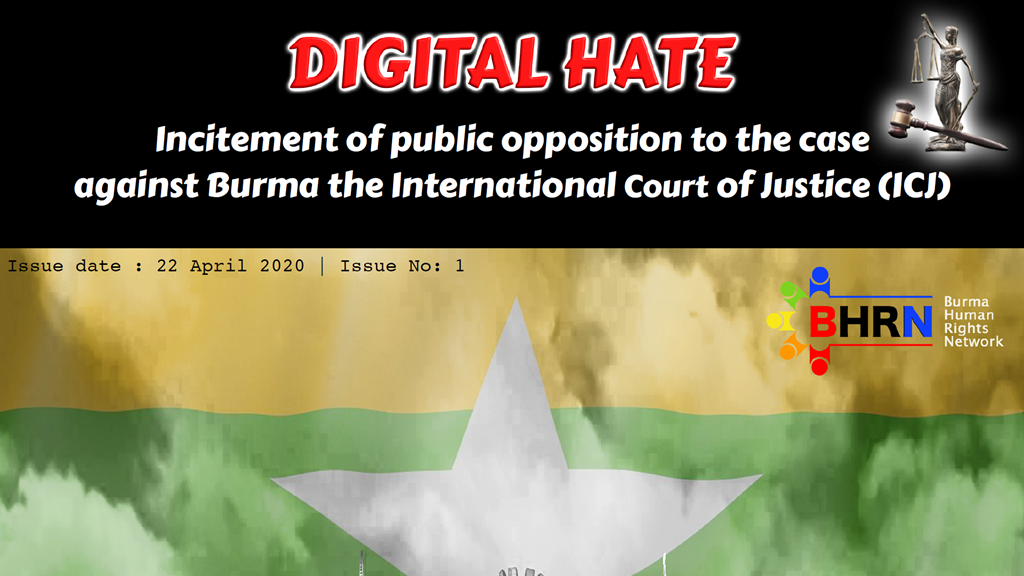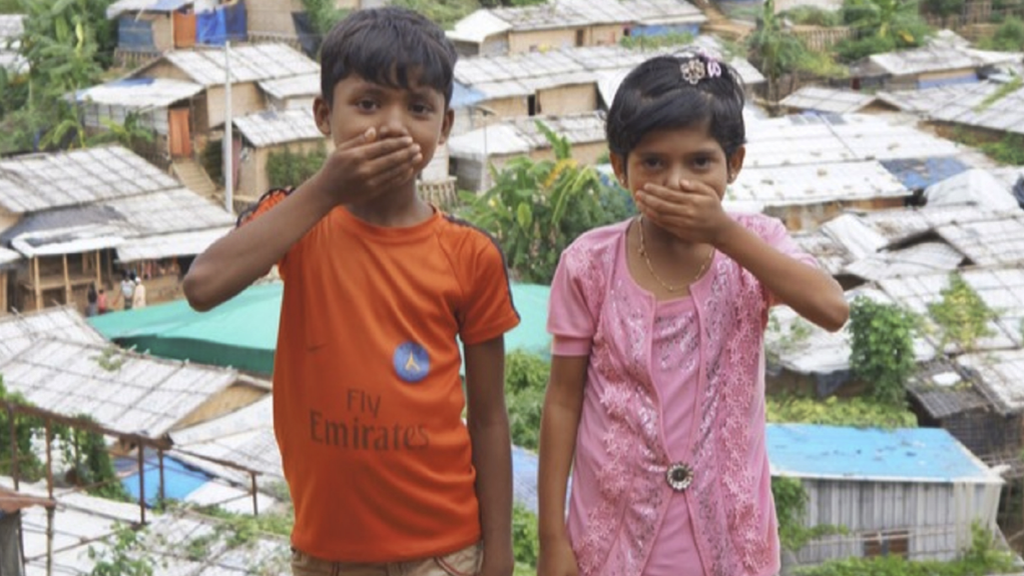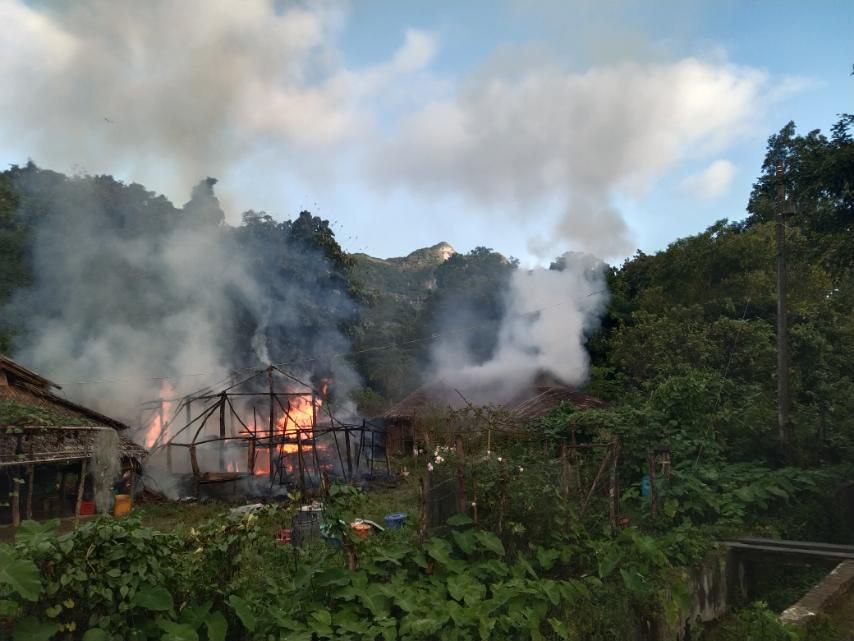
DIGITAL HATE | Report by BHRN
- 23/04/2020
- 0
DIGITAL HATE
Acknowledgement:
Digital Hate is an ongoing series by Burma Human Rights Network that will regularly publish information regarding the spread of hate speech inside of Burma and the risks of escalating tensions and violence that could occur as a result. Issues will be released as relevant topics emerge, rather than monthly, to ensure that the information contained in the issue is pertinent and current.
BHRN has tried best the nearest translation of the original Facebook post from Burmese to English and apology in advance if there is any shortcoming.
Executive Summary:
- Following the case against Burma at the International Court of Justice a steady increase in anti-Muslim hate speech has been observed in the country.
- State Counsellor Aung San Suu Kyi’s own language has dismissed the legitimacy of the courts and UN missions while rallying the public against them.
- Individuals close to Aung San Suu Kyi and the National League for Democracy have posted comments on social media advocating the death of Rohingya and undermining the ICJ’s legitimacy.
- A former military officer and ally of the military aligned USDP party spread conspiracy theories about Rohingya as part of an Islamic invasion into Buddhist lands and demonised the Rohingya as unwanted even among Muslims. The same officer referred to the ICJ case as a “threat to rape the future of Myanmar”
- Several prominent Buddhist-nationalists continue to use social media to spread disinformation about the ICJ case and demonise Muslims.
- The grandson of former Burmese Dictator Ne Win has frequently used social media to demonise the Rohingya and undermine the legitimacy of the ICJ case, once writing, “The exiled Bengali activists should be prosecuted as they are the traitors who are liars and working for the cause of Bengali people.”
- Facebook continues to be slow or inactive in moderating posts containing hate speech by public figures and nationalist inside of Burma.
Methodology:
The information compiled in this report is based upon the monitoring of hundreds of social media accounts and thousands of posts. The information presented in this report highlights the most prominent figures among those posting hate speech on social media. The information compiled is from December of 2019 to February of 2020. The staff who compiled this information live inside of Burma and are native Burmese speakers. Any interviews conducted in relation to this report were done in Burmese by native Burmese speakers living inside of Burma.
Introduction
This first issue of Digital Hate focuses on hate speech around the International Court of Justice’s ruling to allow provisional measures against Burma to protect the ethnic Rohingya while the court investigates Burma for genocide against them. Burma was ordered to submit a review on 23rd May of measures they’ve taken to demonstrate to the court that they have complied with the ruling. Burma Human Rights Network has documented several of Burma’s failings to do so since the order was issued and it appears possible Burma will not submit any documents demonstrating compliance.
Since a lawsuit against Burma was submitted to the International Court of Justice (ICJ), there have been increased attacks against the case on several social media platforms, including Facebook and VK (A Russian based social media). Most of the comments in the social media posts about the issue suggest that the lawsuit was unjustly submitted to the ICJ through collusion between the court and the Organisation of Islamic Cooperation (OIC).
There have been several posts by pro-nationalists that appeared on Facebook and VK against the West African State of The Gambia which filed the lawsuit against Burma in the ICJ. The posts also criticised political activists and Civil Society Organisations (CSOs) which support the lawsuit, calling them traitors.
In an address to the nation on 18 December last year, the State Counsellor Daw Aung San Suu Kyi shared her experience of representing the country at the ICJ. She said the accusations made in the lawsuit by The Gambia were based on the report of the International Fact-finding Mission on Myanmar (FFM). She said Burma did not recognise the FFM from the time it was established by the United Nations Human Rights Council. She said, “If the people of Myanmar stand together with us it would be an invaluable strength for us”. This message amounts to advocating for public opposition to the case.
Conclusion
The abuse of social media in Burma has long inflamed religious tensions in the country. Anti-Muslim and xenophobic attitudes in the country are widespread and social media has allowed them a greater platform that is often used as a launching point for real world violence. The use of social media for this purpose by prominent figures connected to the ruling NLD party and Military sets the tone for the rest of the country that it is acceptable to incite hatred and violence online that spills over into the real world. These platforms are also used as a tool to gather support for nationalism in opposition to human rights efforts by the international community. In doing so the NLD and military are working towards the rejection of any finding by UN bodies and rulings by the international courts. As hatred and nationalism spread, those in power are better able to avoid taking any responsibility for egregious human rights violations. In this way, the State Counsellor, Aung San Suu Kyi, mentioned in an address to the nation that the government does not recognise the UN’s Fact Finding Mission. Her statement that the lawsuit against Burma in the ICJ is based on the report of the FFM indicates that Burma will not accept the verdict by the ICJ. It also indicates that she will use public backing as a strength to oppose the ICJ verdict.
The comments by the two leading supporters of Daw Aung San Suu Kyi in which they justified the killing of Rohingya sends an alarming message on the safety of Rohingya people, who still remain in Rakhine State. As the NLD is widely viewed as the party of freedom and justice in opposition to the military in the country, their tone is especially relevant and shapes the national dialogue. Where demonisation and degradation of the Rohingya are normalised among NLD circles, the rest of the population will follow.
On top of all of this, the widespread public support for extremist views in relation to the lawsuit against Burma in the ICJ can be clearly seen through the support of the social media posts which advocate for extremist views against Rohingya people. As the lawsuit continues it is likely that hate speech, anti-Muslim sentiment will increase. As this trend worsens it is likely that violence against Muslims in Rakhine State and throughout the country will likely follow.
The Burmese Government must take decisive steps to stop all hate speech by government figures and those associated with them. Political parties must set forward standards for the population to follow that encourage tolerance and understanding to avoid further violence. The military must similarly hold all members to the highest standard and avoid any association with individuals promoting discriminatory ideologies.
Social media companies, particularly Facebook, need to increase efforts to monitor and moderate hate speech used on their platforms. Exceptions should not be made for any public figures, especially when their platforms have previously been used as instruments to organise riots, killings, and religious nationalist sentiment. Posts containing dehumanising language against any ethnic group should be removed as soon as it is reported as a violation of terms of service. Facebook’s efforts to increase its staff that can monitor Burmese language posts has surprisingly missed out to remove above posts; although it has been helpful, but more work and transparency is needed to ensure they do not contribute to further violence.
The international community must address the issue of hate speech directly with the Burmese Government and insist that all parties refrain from engaging in discriminatory behaviour. It should be made clear to Burma that this kind of language has already resulted in violence against minorities and mass atrocities that it must stop. All parties in the international community should recognise that hate speech by Burmese politicians and military figures is blatantly in defiance of provisions ordered by the International Court of Justice ordering Burma to end all activity which enables or continues the genocide of the Rohingya.
ABOUT BHRN:
BHRN is funded by the National Endowment for Democracy (NED), Unitarian Universalist Service Committee (UUSC), the American Jewish World Service (AJWS), Tide Foundation (TF), and private donors. We have members across Burma and on the Thailand and Bangladeshi borders. Any information we receive is checked for credibility by experienced journalists and researchers in the organisation. We publish press releases and reports after our own investigations.
Kyaw Win
Founder & Executive Director of BHRN
kyawwin78@gmail.com
+44(0) 740 345 2378
http://www.bhrn.org.uk
http://www.facebook.com/bhrnuk
http://www.twitter.com@bhrnuk
Company number 09633796. Private Limited Company by guarantee without share capital use of ‘Limited’ exemption, incorporated on 11 June 2015.
